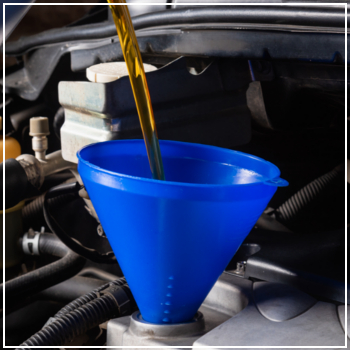Does Your Car Need Synthetic or Conventional Oil?
 Next time you get an oil change, you might be asked whether you want conventional or synthetic motor oil. The mechanic may give some advice based on your car’s model and how many miles it has on the odometer.
Next time you get an oil change, you might be asked whether you want conventional or synthetic motor oil. The mechanic may give some advice based on your car’s model and how many miles it has on the odometer.
Synthetic oil has become more popular over the years. It used to be mainly for high-performance cars, but now many everyday vehicles are switching to it because of its low viscosity, which allows it to flow more easily. This can reduce stress on your engine and even improve fuel efficiency.
It's estimated that around 70% of new cars use synthetic or a synthetic blend instead of regular oil. However, conventional oil still has its place, especially in older vehicles or certain driving conditions. Here's what you need to know about both options.
Advantages of Synthetic Oil
Synthetic oil starts with the same base as conventional oil—crude oil—but then it goes through a chemical process where additives like castor wax, paraffin, or polyalphaolefin are added. There’s fully synthetic oil and synthetic blends, which mix some conventional oil to keep costs lower. Both types flow better at cold temperatures, last longer, help clean engine debris, and offer better protection for engine parts.
Here are some key reasons why synthetic oil is often preferred:
- Synthetic oil is less likely to break down and can handle higher temperatures, giving your engine a longer lifespan.
- It flows more easily in winter, helping your engine start up faster and run smoother when it's cold.
- It performs better in hot weather and is less prone to evaporation under high heat.
- Great for short trips and city driving, where engines don’t always get warm enough. It helps remove moisture and prevents sludge buildup, reducing the risk of clogs and overheating.
- More cost-effective for heavy-duty use, like towing or hauling, due to its durability and extended service life.
- It lasts two to three times longer than conventional oil, meaning fewer oil changes and less waste. Some synthetic oils can go up to 15,000 miles between changes, compared to the typical 3,000 miles for conventional.
- Synthetic oil is less likely to hold water or particles that can cause rust and corrosion.
Keep in mind that not all synthetic oil changes are the same. Stick to the recommended interval—usually 5,000 miles—or check your car’s manual for specific guidance.
When to Choose Conventional Oil
Conventional oil is made from crude oil with some additives to improve heat resistance and viscosity. It’s usually more affordable. Depending on the brand, synthetic oil can cost up to four times more, though some blends only cost a little extra. While synthetic is often recommended, there are situations where conventional oil is a better choice:
- Older cars, since their engines were designed to work best with conventional oil. In some cases, it provides better lubrication and protection than synthetic.
- Vehicles with less than 75,000 miles. At this point, engines are still relatively new and less prone to wear, so they don’t suffer from the lower viscosity of conventional oil.
However, conventional oil doesn’t last as long and takes longer to warm up in cold weather. This can lead to:
- More frequent oil changes, ideally every 3,000 miles.
- A higher risk of engine clogs and sludge buildup.
- Increased strain on your engine in cold climates, especially if it hasn’t warmed up yet.
- More chances of holding onto dirt and moisture, which can damage your engine if you delay oil changes.
If you're ready for an oil change, book an appointment with DaSilva’s Auto Body today. Visit our Naugatuck location and keep your car running smoothly for years to come.
Bag Filter Housing is a type of filtration system used to remove impurities and contaminants from liquids. It is commonly used in industries such as food and beverage, pharmaceuticals, chemicals, and oil and gas. The housing consists of a vessel that contains a filter bag, which is used to capture particles and debris.
The bag filter housing is designed to ensure that the liquid being filtered is free from any impurities that may affect the quality of the end product. The housing is made of high-quality materials that are resistant to corrosion and can withstand high pressures and temperatures. The filter bag is made of various materials such as nylon, polyester, and polypropylene, depending on the application.
The bag filter housing is easy to install and maintain, making it a popular choice for many industries. The filter bag can be easily replaced when it becomes clogged or dirty, ensuring that the filtration process remains efficient. The housing also has a drain port that allows for easy cleaning and maintenance.
One of the main advantages of the bag filter housing is its versatility. It can be used for a wide range of applications, including filtering water, oils, chemicals, and other liquids. The housing can also be customized to meet specific requirements, such as the size and shape of the vessel and the type of filter bag used.
In conclusion, the bag filter housing is an essential component in many industries, ensuring that liquids are free from impurities and contaminants. Its versatility, ease of installation, and maintenance make it a popular choice for many businesses. With the right filter bag and housing, businesses can ensure that their products meet the highest standards of quality and purity.
, bag filter vessel, sand filter, duplex bag filter housing, jacketed bag filter housing
Xinxiang Zhike Machinery Equipment Co.Ltd , https://www.zhikefilter.com